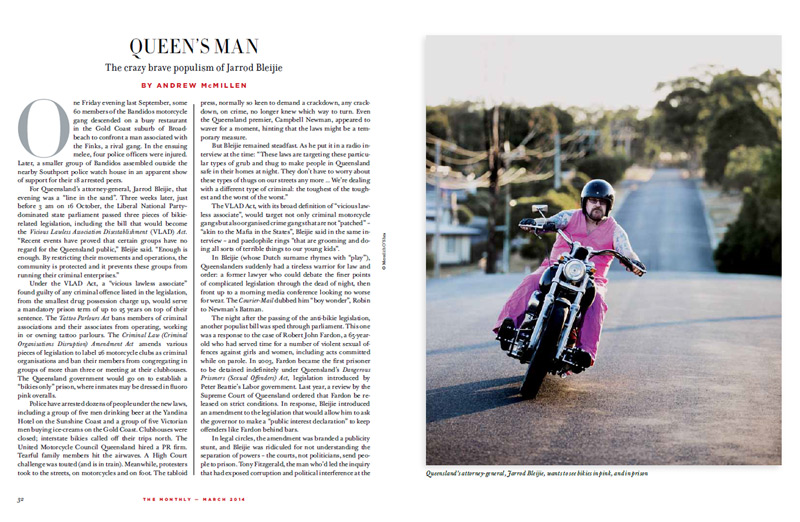The Monthly story: ‘Queen’s Man: Jarrod Bleijie’, March 2014
A story for the March 2014 issue of The Monthly, and my first essay for the magazine: a profile of Queensland’s attorney-general, Jarrod Bleijie. Excerpt below.
The crazy brave populism of Jarrod Bleijie
One Friday evening last September, some 60 members of the Bandidos motorcycle gang descended on a busy restaurant in the Gold Coast suburb of Broadbeach to confront a man associated with the Finks, a rival gang. In the ensuing melee, four police officers were injured. Later, a smaller group of Bandidos assembled outside the nearby Southport police watch house in an apparent show of support for their 18 arrested peers.
For Queensland’s attorney-general, Jarrod Bleijie, that evening was a “line in the sand”. Three weeks later, just before 3 am on 16 October, the Liberal National Party–dominated state parliament passed three pieces of bikie-related legislation, including the bill that would become the Vicious Lawless Association Disestablishment (VLAD) Act. “Recent events have proved that certain groups have no regard for the Queensland public,” Bleijie said. “Enough is enough. By restricting their movements and operations, the community is protected and it prevents these groups from running their criminal enterprises.”
Under the VLAD Act, a “vicious lawless associate” found guilty of any criminal offence listed in the legislation, from the smallest drug possession charge up, would serve a mandatory prison term of up to 25 years on top of their sentence. The Tattoo Parlours Act bans members of criminal associations and their associates from operating, working in or owning tattoo parlours. The Criminal Law (Criminal Organisations Disruption) Amendment Act amends various pieces of legislation to label 26 motorcycle clubs as criminal organisations and ban their members from congregating in groups of more than three or meeting at their clubhouses. The Queensland government would go on to establish a “bikies only” prison, where inmates may be dressed in fluoro pink overalls.
Police have arrested dozens of people under the new laws, including a group of five men drinking beer at the Yandina Hotel on the Sunshine Coast and a group of five Victorian men buying ice-creams on the Gold Coast. Clubhouses were closed; interstate bikies called off their trips north. The United Motorcycle Council Queensland hired a PR firm. Tearful family members hit the airwaves. A High Court challenge was touted (and is in train). Meanwhile, protesters took to the streets, on motorcycles and on foot. The tabloid press, normally so keen to demand a crackdown, any crackdown, on crime, no longer knew which way to turn. Even the Queensland premier, Campbell Newman, appeared to waver for a moment, hinting that the laws might be a temporary measure.
But Bleijie remained steadfast. As he put it in a radio interview at the time: “These laws are targeting these particular types of grub and thug to make people in Queensland safe in their homes at night. They don’t have to worry about these types of thugs on our streets any more … We’re dealing with a different type of criminal: the toughest of the toughest and the worst of the worst.”
The VLAD Act, with its broad definition of “vicious lawless associate”, would target not only criminal motorcycle gangs but also organised crime gangs that are not “patched” – “akin to the Mafia in the States”, Bleijie said in the same interview – and paedophile rings “that are grooming and doing all sorts of terrible things to our young kids”.
In Bleijie (whose Dutch surname rhymes with “play”), Queenslanders suddenly had a tireless warrior for law and order: a former lawyer who could debate the finer points of complicated legislation through the dead of night, then front up to a morning media conference looking no worse for wear. The Courier-Mail dubbed him “boy wonder”, Robin to Newman’s Batman.
The night after the passing of the anti-bikie legislation, another populist bill was sped through parliament. This one was a response to the case of Robert John Fardon, a 65-year-old who had served time for a number of violent sexual offences against girls and women, including acts committed while on parole. In 2003, Fardon became the first prisoner to be detained indefinitely under Queensland’s Dangerous Prisoners (Sexual Offenders) Act, legislation introduced by Peter Beattie’s Labor government. Last year, a review by the Supreme Court of Queensland ordered that Fardon be released on strict conditions. In response, Bleijie introduced an amendment to the legislation that would allow him to ask the governor to make a “public interest declaration” to keep offenders like Fardon behind bars.
In legal circles, the amendment was branded a publicity stunt, and Bleijie was ridiculed for not understanding the separation of powers – the courts, not politicians, send people to prison. Tony Fitzgerald, the man who’d led the inquiry that had exposed corruption and political interference at the highest level in Joh Bjelke-Petersen’s government 25 years earlier, was prompted to write in Brisbane’s Courier-Mail: “It is incomprehensible that any rational Queenslander who is even remotely aware of the state’s recent history could for a moment consider reintroducing political interference into the administration of criminal justice, even to the point of making decisions about incarceration.”
Weeks later, Queensland’s Court of Appeal struck down the new laws, agreeing that they would have required the Supreme Court to “exercise powers repugnant to or incompatible with [its] institutional integrity”.
“To have any politician alone decide who’s going to be in jail or not is scary,” says Dan O’Gorman, a prominent Brisbane barrister. “I’ve acted for Fardon for seven years. He’s had a terrible life himself, which doesn’t justify his behaviour, of course. But Fardon is not the issue; the issue is the process. [Bleijie] just doesn’t seem to understand the role of an A-G. Unfortunately, not only has this fellow not defended the institutional integrity of the judicial process, he’s the leader of the cheer squad that’s attacking the courts. It’s an unbelievable situation.”
To read the full 3,000 word story, visit The Monthly’s website.
